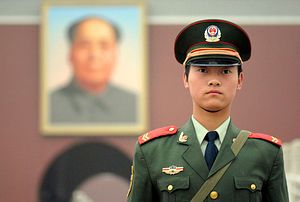Last week, Qiushi journal, the Chinese Communist Party’s (CCP) main theoretical periodical, published an article written by Chinese President Xi Jinping.
Before the article — titled “Strengthening the Party’s leadership over the overall rule of law” — was published, Chinese state news TV station CCTV and Chinese state news agency Xinhua had already promoted the piece, boasting about its significance.
In this 5,000-plus-word article, Xi repeatedly stresses the importance of the CCP’s leadership over China’s legal system and urged the Party to further strengthen its leadership.
“Why can China maintain long-term stability without chaos? The fundamental reason is that we always adhere to the leadership of the Communist Party,” Xi claimed. “We must further institutionalize and legalize the party’s leadership.”
Specifically, Xi complimented the latest amendments to the Chinese Constitution.
As The Diplomat reported last year, the CCP added one sentence — “The leadership of the Communist Party of China is the defining feature of socialism with Chinese characteristics” — into Chapter 1, Article 1 of the constitution and, most shockingly, removed the two-term limit for the presidency and the vice presidency. This constitutional amendment brought about an unprecedented wave of criticism worldwide, but Xi said in the article that “The constitutional amendment has received very good response in all aspects.”
Xi also vowed that China “must never copy the models or practices of other countries.”
“We must never follow the path of Western ‘constitutionalism,’ ‘separation of powers,’ or ‘judicial independence,’’’ Xi said.
Yet in terms of foreign affairs, Xi argued that China “should be apt at using law when participating in international affairs. ” He explained:
In the struggle against foreign powers, we must take up legal weapons, occupy the high point of the rule of law, and say no to the saboteurs and spoilers. The global governance system is in a critical period of adjustment and change. We must actively participate in the formulation of international rules and act as participant, promoter, and leader during the changing process of global governance.
On legal talent, Xi highlighted the importance of building a “socialist legal team” whose members are “loyal to the Party, to the state, to the people, and to the law. ”
It’s worth mentioning that the long article is an excerpt of a speech made by Xi on August 24, 2018. On that day, the CCP Central Committee formally set up the Commission for Law-based Governance and Xi himself was appointed as the head of this commission, according to Xinhua.
In fact, early in 2017, the CCP had already added “Party, government, military, civilian, and academic, east, west, south, north, and center, the party leads everything” — the phrase coined by Mao Zedong — into the CCP’s constitution. By doing so, the CCP has officially placed the Party above everything else on paper.
Xi’s recent emphasis on the CCP’s leadership over the legal system is only one aspect of the implementation of this specific sentence.
What’s interesting is actually the timing of this publication. Qiushi journal decided to publish Xi’s speech at the very moment when Beijing and Washington are close to making a deal on the trade dispute. It might be a warning message against those who are not satisfied with China’s concessions to the United States.

































